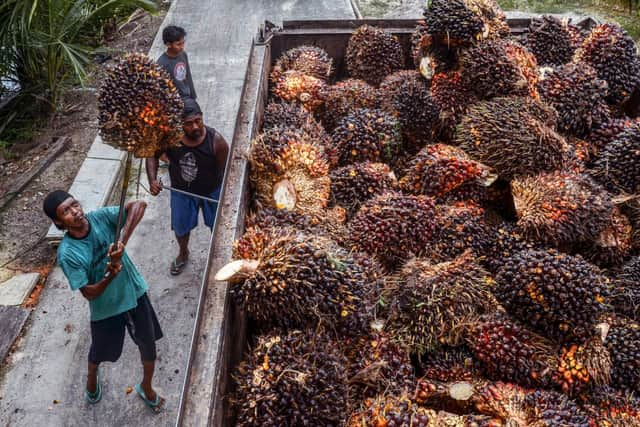Why is there a cooking oil shortage? Supermarket limits on olive oil, sunflower oil and rapeseed oil explained
and live on Freeview channel 276
Several major UK supermarkets have been forced to limit the amount of cooking oil shoppers can purchase.
Supplies of olive oil, sunflower oil and rapeseed oil - all of which are also key ingredients in many food products - are now being rationed at retailers including: Tesco, Morrisons and Waitrose.
Advertisement
Hide AdAdvertisement
Hide AdPrices of these cooking oils had already shot up by more than a third as of March 2022, according to the latest Office for National Statistics (ONS) inflation figures.
Iceland boss Richard Walker has said the shortages have not led to the “frenzied” panic buying seen at the beginning of the Covid pandemic.


So why are these cooking oils running short - and what are the limits being placed on consumers?
Here’s what you need to know.
Why is there a cooking oil shortage?
Unlike most recent product shortages - where issues have mostly been caused by supply chain disruption stemming from panic-buying, Covid or Brexit - cooking oils are running short because of the Russia-Ukraine war.
Advertisement
Hide AdAdvertisement
Hide AdBoth countries are key suppliers of sunflower and rapeseed oil - two products which are not only used in cooking oils but are key ingredients in many food products, like mayonnaise and crisps.
In fact, Russia and Ukraine are responsible for between 60% to 78% of the world’s sunflower oil supply.
Most of the UK’s sunflower oil comes from Ukraine.


For rapeseed oil, the UK is roughly 50% self-sufficient - although this percentage has been declining in recent years after the banning of a key pesticide resulted in major crop losses, which in turn have led farmers to plant less oilseed rape.
Given the widespread destruction in Ukraine and the displacement of millions of its citizens, there’s a lot of uncertainty over how much of either crop will be planted and harvested in 2022.
Advertisement
Hide AdAdvertisement
Hide AdThis uncertainty - mixed with a near-total halt to shipments out of Ukraine - has meant both cooking oils are now in shorter supply in supermarkets, while substitutes like olive oil are struggling to keep up with demand.


The situation has also put food manufacturers “under real pressure”, according to the Food and Drink Federation.
Not only are they paying more for what little sunflower and rapeseed oil remains, but they are also having to look for substitutes - namely palm oil - with the prices of these substitutes now also going up due to demand.
For example, Iceland boss Mr Walker told BBC Radio 4’s Today programme: “If you look at commodity prices, sunflower oil has gone up 1,000% in terms of the commodity cost in the market, palm oil (up) 400% and then there is things like wheat, 50%, fertiliser, 350%.
Advertisement
Hide AdAdvertisement
Hide Ad“These are all unintended consequences of the war in Ukraine that is affecting supermarkets.”
Price rises have already fed through to consumers to some extent, with Consumer Price Index figures for March 2022 showing vegetable oil prices have risen 34.8% on average.
More increases could be on their way after Indonesia announced it would bring in an export ban on palm oil from Thursday (28 April).


The country’s President Joko Widodo said he had made the move to help his country - the world’s biggest palm oil producer - cope with its own cost of living crisis.
Advertisement
Hide AdAdvertisement
Hide AdBut the announcement is likely to raise prices for all cooking oils the world over, Reuters says, as well as the foods they are key ingredients in - for example, chocolate, spreads and laundry detergent.
What limits are supermarkets putting on cooking oil?
As of Saturday (23 April), the major UK supermarkets rationing olive, sunflower and rapeseed oils are:
- Tesco (three items per customer)
- Morrisons (two items)
- Waitrose (two items)
- Iceland (one item per shopper)
Gaps on shelves and substitutions of cooking oils in online orders have also been seen by Sainsbury’s, Asda, Aldi and Lidl customers in recent weeks - although these retailers have not brought in any restrictions on how much you can buy.
The British Retail Consortium (BRC) - a trade body which represents most of the country’s biggest food retailers - says rationing is a temporary measure “to ensure availability for everyone”.
Advertisement
Hide AdAdvertisement
Hide AdThe organisation says its members are “working with suppliers to ramp up production of alternative cooking oils, to minimise the impact on consumers”.
Tesco, which is not represented by the BRC, said in a statement: “We have good availability of cooking oils in stores and online. If a customer is unable to find their preferred oil, we have plenty of alternatives to choose from.
“To make sure all of our customers can continue to get what they need, we’ve introduced a temporary buying limit of three items per customer on products from our cooking oil range.”
Additional reporting from PA news agency
Comment Guidelines
National World encourages reader discussion on our stories. User feedback, insights and back-and-forth exchanges add a rich layer of context to reporting. Please review our Community Guidelines before commenting.
